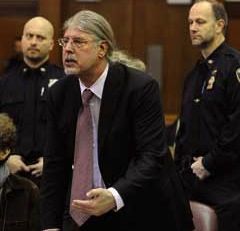
The Nassau County District Attorney’s Office appeared in the Appellate Division in Brooklyn on Tuesday to argue against a lower court ruling requiring the DA’s office to turn over case files relating to the 25-year-old child molestation conviction of Jesse Friedman.
Paul Leonard, press secretary for the district attorney’s office, said the DA’s office argued that releasing the material would invade the privacy of Friedman’s victims and make future victims of molestation hesitant to come forward.
Leonard also said releasing the statements would infringe on the privacy of victims who thought they would never have to testify again as a result of Friedman’s guilty plea.
“We’ve consented to a future public hearing on Mr. Friedman’s claims of innocence and we base our opposition to the release of confidential material on longstanding legal precedent and our ongoing commitment to protect these sex crime victims,” Leonard said.
Lonnie Soury, Friedman’s spokesperson, said Friedman’s attorney Ronald Kuby argued that the 17,000 pages of documents state Supreme Court Justice Dana Winslow ordered former District attorney Kathleen Rice to hand over in August 2013 was favorable to the defense.
“We very much believe it’s important that the truth come out,” Soury said. “The only way the truth can come out is to find out what happened in the questioning of the children.”
Soury said the defense does not think there is a confidentiality issue. But Leonard said redacting the names wouldn’t necessarily protect the victims’ identities.
Friedman and his father Arnold Friedman were arrested and pleaded guilty in 1988 to sexually abusing young boys enrolled in a computer class in his family’s Great Neck home. Friedman was released on parole in 2001 and soon retracted on his guilty plea, saying his confession was coerced from law enforcement officials and that police manipulated false abuse claims from the alleged victims. His father died in prison.
Friedman’s claims of actual innocence were later chronicled in the documentary “Capturing the Friedmans.”
Winslow ruled in August 2013 that Rice hand over “every piece of paper” of the DA’s case file on Friedman, except the victims’ names.
The ruling followed a three-year investigation by the DA’s office after the Second U.S. Circuit Court of Appeals indicated in 2010 that there may be evidence suggesting Friedman may have been wrongfully convicted.
Rice who resigned as district attorney in January after being elected to Congress in November, said at the time her office’s investigation confirmed Friedman’s original conviction, which took place under another district attorney.
But later did not oppose future hearings on Friedman’s claim of innocence.
Leonard said the three-year long re-investigation of the panel was done with no pre-conceived notion of guilty and no agenda.
Soury said some of the children interviewed in the original criminal case against Friedman were interviewed up to 15 times, and that Winslow himself saw changes in victims’ statements.
He said the defense wants statements from the children in the classes who said they were abused, as well as statements from the children sitting next to the children who said they were abused.
The police, he said, interviewed up to 100 children, but they got only about 13 or 14 statements. Soury also said the defense knows police talked to parents of children in the class, and would like to see those statements as well.
It could be a matter of weeks or months until the court makes a decision on Tuesday’s hearing, he said.
Acting District Attorney Madeline Singas said before the hearing that with any high-profile case people bring preconceived notions, but that her office works hard to pick juries that look at the facts.
“Now, more people have more access to more media outlets,” Singas said. “We want to focus people on the evidence as opposed to what they think the evidence is.”
In December, Nassau County Supreme Court Justice Teresa Corrigan approved the motion for an evidentiary hearing.
Corrigan denied Friedman’s motions to overturn his convictions based on the prosecution knowingly using false testimony and a coerced guilty plea to gain the conviction.






